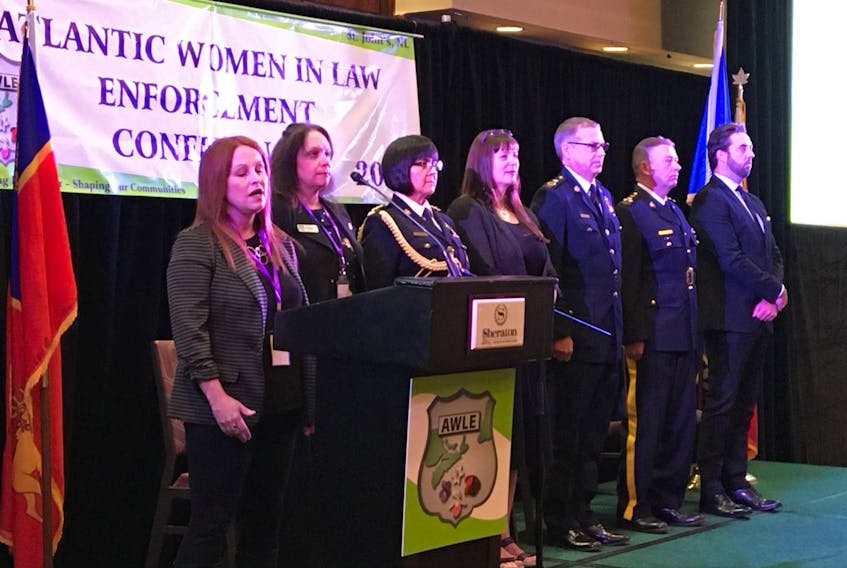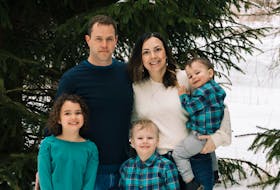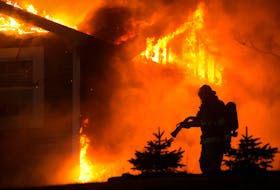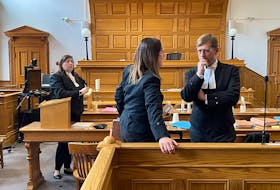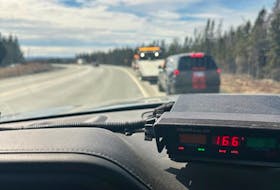ST. JOHN'S, N.L. — The sight of hundreds of female police officers in a hotel ballroom is something that wouldn’t have existed a few decades ago.
“When I joined (the RNC in 1988), I was an anomaly,” Insp. Sharon Warren told The Telegram Wednesday during the 27th Atlantic Women in Law Enforcement Conference at the Sheraton Hotel in St. John’s.
“There were very few women. When we went to a call, it became about, ‘Oh my God, you’re a girl.’

“It was a struggle before because it was male-dominated. It was the roughness. It was the brawn, as opposed to the brain, the communication skills.
“That dynamic has changed so much now.”
Warren — who is among the RNC’s top brass — said that in her early days as a police officer in a male-dominated job, females made up just eight per cent of the force. Today, they make up close to 30 per cent, she said.
“That’s phenomenal,” she said. “We’ve opened the doors and allowed women to understand they can be police officers. They can be strong and diligent.
“The face of the police service is changing, and with that is the awareness and acceptance by the community.”
But Warren said the sad reality is that female law enforcement officers still face barriers and a battle for equality — both within the force and in the community.
“We always feel like we have to fight harder, be louder and be stronger to get the same accomplishment and the same acknowledgment,” Warren said. “Sometimes, we question ourselves too much.
“We are capable. We’re smart. We’re educated. We do this job as good, and sometimes better, than our (male) counterparts, but yet we feel we have to compare ourselves to our counterparts.
“We’ve come a long way and we need to be grateful for that, but we can’t let the fight stop there. We need to keep it up.
Role models
Retired RCMP Const. Beverly Bryant, who became a police officer 30 years ago, can relate to what Warren faced three decades ago.
“It was almost like being a big sister with a whole bunch of big brothers,” she said. “You look up to them to show you the ropes. There were very few women role models back in the day.
“You had to be super stronger and super smarter (to be taken seriously).”
Often, members of the public would come to the police detachment and think she was a clerk, she said.
“Those roles have changed these days,” she said. “We have men doing clerical work in detachments and women out policing."
Bryant — who continues to be involved as a director with the International Police Association — said with the younger generation having so many more role models, it’s encouraging to see so many women move up the ranks.
Justice Minister Andrew Parsons, who spoke at the conference, pointed out his department includes several women in leadership roles.
“We’ve come a long way and we need to be grateful for that, but we can’t let the fight stop there. We need to keep it up." — RNC Insp. Sharon Warren
They include the department’s deputy minister and assistant attorney general, Jennifer Mercer; chief legislative counsel Susan King; chief justice of the Newfoundland and Labrador Court of Appeal Deborah Fry; and provincial court chief judge Pamela Goulding. He noted three of four assistant deputy ministers in the government are women, and 50 per cent of provincial court judges are women.
“Having that amount of strong female leadership … makes us a better department and a better province as a whole,” said Parsons, noting the government’s move in creating the country’s first and only standalone Status of Women department. “But the reality is we know there is still work left to do. We know we have to do more.”
Special skills
RNC Deputy Chief Paul Woodruff said female officers have many special skills, such as problem-solving, interpersonal skills, volunteering in the community, showing empathy and compassion to victims of crime, investigating major crimes and conducting complex forensic work.
RNC Deputy Chief Paul Woodruff speaks to large gathering of female officers at the 27th Atlantic Women in Law Enforcement Conference, being held today at the Sheraton Hotel in St. John’s. @SaltWireNetwork @RNC_PoliceNL @RCMPNL pic.twitter.com/UT3qXY8GRr
— Rosie Mullaley (@TelyRosie) October 16, 2019
“For all that you do, from being able to pivot in a heartbeat between roles and tasks and requirement, thank you for making a positive change in people’s lives,” Woodruff told the crowd.
“Thank you for coming here to present issues and ideas, to push boundaries, to challenge, to make things better for your membership and to push for more effective police services.”
RCMP Assistant Commissioner Ches Parsons, commanding officer Newfoundland and Labrador, told the group that a female officer — whom he referred to only as “Deanne,” one of the first female officers to be assigned to the Toronto Metro Police Department’s homicide team — was a big mentor in his career.
Assistant Commissioner Ches Parsons, Commanding Officer of the RCMP Newfoundland and Labrador, was one of the guest speakers at the 27th Atlantic Women in Law Enforcement Conference in St. John’s this morning. @SaltWireNetwork @RCMPNL @RNC_PoliceNL @AWLE2019StJohns pic.twitter.com/qHGdvXSWuA
— Rosie Mullaley (@TelyRosie) October 16, 2019
“You’re here today to do a great deal beyond simply networking and learning. You’re here to advance a cause which is critical to the integrity of our profession,” Parsons said.
“Equality of women is important. In fact, it’s pre-eminent right now. It’s something that we have moved with every bit of verve and zest we can muster towards. It has been a difficult and uphill struggle.
“I’ve seen many things in my generation that I would’ve rather not seen. But when I see you in front of me now, I understand that, yes, there’s hope for the future. There’s movement. There’s impetus. There’s absolute potential in every single one of you and I pray that you all move collectively to realize it.”
Twitter: @TelyRosie
RELATED

